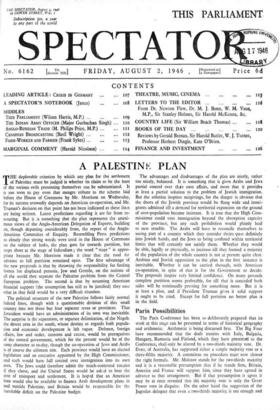A PALESTINE PLAN
/II HE deplorable criterion by which any plan for the settlement of Palestine must be judged is whether its claim to be the least of the various evils .presenting themselves can be substantiated. It is too soon to. pay even that meagre tribute to the scheme laid before the House of Commons by Mr. Morrison on Wednesday, for its success avowedly depends on American co-operation, and Mr. Truman's decision on that point has not been indicated as these lines are being written. Latest predictions regarding it are far from re- assuring. But it is something that the plan represents the unani- mous views of the Anglo-American Delegation of Experts, building on, though departing considerably from, the report of the Anglo- American Committee of Enquiry. Resembling Press predictions so closely that strong words were used in the House of Commons on the subject of leaks, the plan goes far towards partition, but stops short at the stage of federalism ; the word " stage " is appro- priate because Mr. Morrison made it clear that the road for advance to full partition remained open. The first advantage of the new proposals is that by throwing the responsibility for finding homes for displaced persons, Jew and Gentile, on the nations of all the world they separate the Palestine problem from the Central European problem. The second is that by assuming American financial support (the assumption has still to be justified) they ease what in that field would be a very difficult situation.
The political structure of the new Palestine follows fairly normal federal lines, though with a questionable division of this small country into not three but four separate areas or provinces. That Jerusalem would have an administration of its own was inevitable. The surprise is the separation, or separate delimitation, of the Negeb. the desert area in the south, whose destiny as regards both popula- tion and economic development is left vague. Defence, foreign affairs, law and order, customs and excise, would be prerogatives of the central government, which for the present would be of the same character as to-day, though the co-operation of Jews and Arabs is of course the ultimate aim. Each province would have an elected legislature and an • executive appointed by the High Commissioner, and each would have full control over immigration into its own area. The Jews could therefore admit the much-contested roo,000 if they chose, and the United States would be asked to bear the cost of transport and settlement. It is hoped that an American loan would also be available to finance Arab development plans in and outside Palestine, and Britain would be responsible for the inevitable deficit on the Palestine budget.
The advantages and diadvantages of the plan are nicely, rather too nicely, balanced. It is something that it gives Arabs and Jews partial control over thir own affairs, and more that it provides at least a partial solution to the problem of Jewish immigration. But the solution inspires misgivings, for the danger is obvious that the doors of the Jewish province would be flung wide and immi- grants admitted till a demand for territorial expansion on.the ground of over-population became insistent. It is true that the High Com- missioner could veto immigration beyond the absorption capacity of the province, but any such prohibition would plainly lead to new trouble. The Arabs will have to reconcile themselves to seeing part of a country which they consider theirs 'pass definitely into Jewish hands, and the Jews to being confined within territorial limits that will certainly not satisfy them. Whether they would be able, legally or physically, to increase till they formed a majority of the population of the whole country is not at present quite clear. Arabian and Jewish opposition to the plan in the first instance is inevitable. Whether it can be carried through, with American co-operation, in spite of that is for the Government to decide. The proposals inspire very limited confidence. On many grounds complete partition seems preferable, for till that is conceded both sides will be continually pressing for something more. But it is at least a plan, and if President Truman gives it solid support it ought to be tried. Except for full partition no better plan is in the field.


























